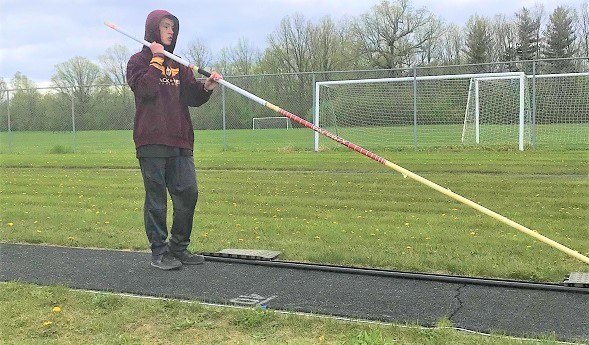
Blind Vaulter Builds on Promising Launch
By
Paul Costanzo
Special for MHSAA.com
May 24, 2019
When Bradly Rainwater’s family members learned he was born blind, they decided to not put any limits on him.
 As it turned out, Bradly had the same mindset.
As it turned out, Bradly had the same mindset.
The Davison sophomore is a pole vaulter on the track & field team. It’s an event that he took up not just because his father and uncle were former all-state pole vaulters, but because it was one of the most difficult events in any sport.
“I have always gone after the hardest things,” Rainwater said. “I thought this would be another thing that I would see if I could do it.”
Rainwater, who also is a member of the marching band and wrestling teams at Davison, recently finished his first full season competing as a vaulter and has proven that he can do it, with a personal best of 8 feet, 6 inches. But he’s not satisfied with simply clearing a height in competition – he wants to go higher.
“In the end, I’d like to go to state and get a reasonable placing,” Rainwater said of his career goals. “That would be good for me. I’d enjoy that. For someone in a situation like mine, or a situation similar, you have to work twice as hard to get things where you want them to be. But I am dedicated to it.”
Davison pole vaulting coach Brad Rainwater, Bradly’s grandfather, is also dedicated to it, and is doing all he can to help his grandson reach his goals. Brad Rainwater has been coaching for four decades, but had to teach himself some new tricks when Bradly came along.
“It’s a learning process for us, as well,” Brad Rainwater said. “We started by putting our heads together, my sons and I, and I took it basically like I would coach anyone, but we had to be more hands-on. Basically, it’s step-by-step. It’s the same way when he wrestles; they have to literally do every movement like step, step, step, step. Everything on the vault is done by steps, so we start him with doing three steps, then four steps, then five steps. We’re thinking of ways to teach him to turn, so we use a lot of rings and high bar so he can get that feel.
“What it’s done for me is made me a better coach, because I have to break everything down. Now I’m a little more technical with them all.”
Recently, Bradly began using a track on the runway to help guide his pole to the box, which allows him to start his run farther back. He’s made steady improvement throughout the season, setting his personal best May 13 during a dual meet against Flint Carman-Ainsworth and matching it two days later at the Heritage Hawks Last Chance Invitational.
During practices with a bungee cord, he has cleared more than 10 feet. He’s also started imparting wisdom on other vaulters.
“If I have young vaulters, he teaches them the first three steps and a plant,” Brad Rainwater said. “If people are around (Bradly) and they didn’t know he was blind, because he’s actually doing the drills or showing kids how to do drills, they go, ‘He’s blind?’”
Bradly said the reaction from teammates and opponents alike has been great.
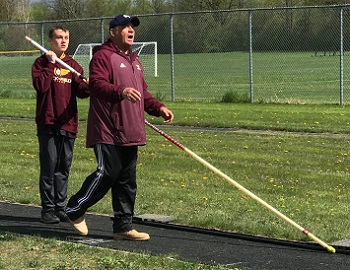 “They work with me some, like they’ll say, ‘You didn’t turn correctly,’ or ‘You didn’t do this correctly,’ which I appreciate, because criticism like that I can’t necessarily see on film,” he said. “Opponents, some of them come up to me and say thank you to me, and that I inspired them. It’s still hard for me to grasp, because I’m not as good as I should be, but I appreciate people saying that.”
“They work with me some, like they’ll say, ‘You didn’t turn correctly,’ or ‘You didn’t do this correctly,’ which I appreciate, because criticism like that I can’t necessarily see on film,” he said. “Opponents, some of them come up to me and say thank you to me, and that I inspired them. It’s still hard for me to grasp, because I’m not as good as I should be, but I appreciate people saying that.”
While there’s no official number of blind individuals who have competed in the pole vault, it is rare.
“I know that he’s only one of maybe three others in the state (history), and the other three had some sight,” Brad Rainwater said. “We try not to limit him; we try not to put him in a box that he can or can’t do that. As far as I know, he’s one of the very few in the country that’s doing this. We love it, because we hope it opens doors for other kids that have desire to do other things.”
Bradly, however, said he hasn’t quite grappled with the fact that what he’s doing is special, as he feels he still needs to get better. That’s his focus now, and it’s reflective of someone who has played sports his entire life, from T-ball to soccer to basketball, and now wrestling and track.
He’s not a blind pole vaulter; he’s simply a pole vaulter. And when he’s done, he wants to be known as a great one.
“I’ve always had the attitude of why not,” he said. “Why not work extra hard to be as good as they are?”
 Paul Costanzo served as a sportswriter at The Port Huron Times Herald from 2006-15, including three years as lead sportswriter, and prior to that as sports editor at the Hillsdale Daily News from 2005-06. He can be reached at [email protected] with story ideas for Genesee, Lapeer, St. Clair, Sanilac, Huron, Tuscola, Saginaw, Bay, Arenac, Midland and Gladwin counties.
Paul Costanzo served as a sportswriter at The Port Huron Times Herald from 2006-15, including three years as lead sportswriter, and prior to that as sports editor at the Hillsdale Daily News from 2005-06. He can be reached at [email protected] with story ideas for Genesee, Lapeer, St. Clair, Sanilac, Huron, Tuscola, Saginaw, Bay, Arenac, Midland and Gladwin counties.
PHOTOS: (Top) Davison pole vaulter Bradly Rainwater lines up for an attempt this spring. (Middle) Rainwater works with his grandfather Brad Rainwater, the school’s longtime pole vaulting coach. (Photos and video provided by the Rainwater family.)
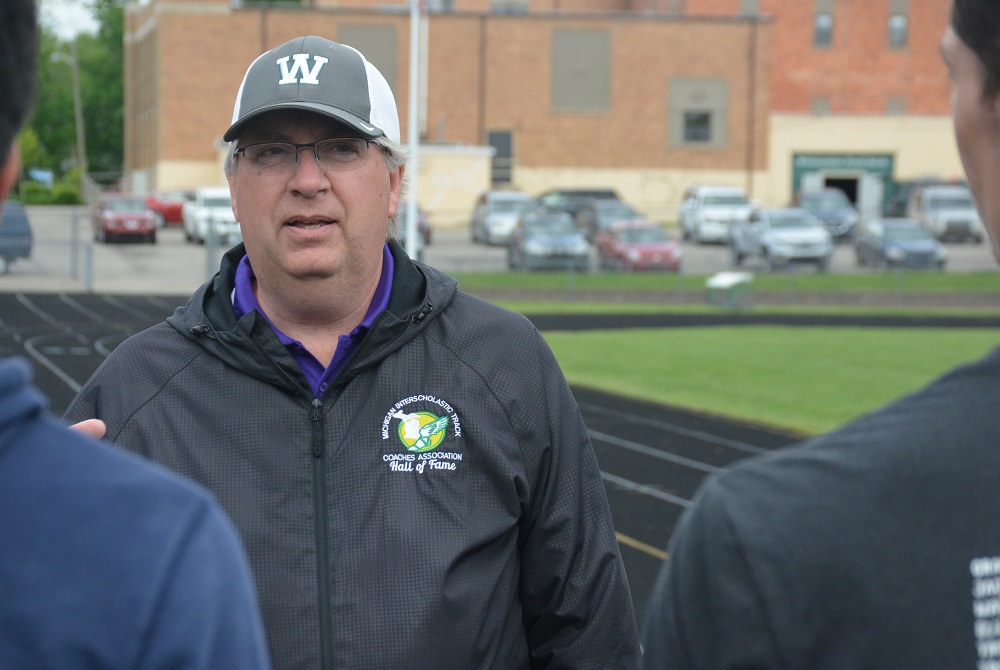
Self-Taught Lutzke Leaving Williamston with Decades of Memorable Lessons
By
Geoff Kimmerly
MHSAA.com senior editor
June 1, 2022
WILLIAMSTON – If it were possible to string together all of the moments that made Mitch Lutzke into a Hall of Fame high school track & field coach, the first half of the video would look like a one-man pentathlon.
 At most, the now-longtime Williamston leader brought into coaching a season of mostly-junior varsity cross country experience as a student at Albion High, and some additional knowledge gleaned from marrying a college All-American runner.
At most, the now-longtime Williamston leader brought into coaching a season of mostly-junior varsity cross country experience as a student at Albion High, and some additional knowledge gleaned from marrying a college All-American runner.
He also didn’t have the internet back then to speed up the learning curve. But he had books to show him technique, and coaching clinics where he’d learn more. The skills he was using as a morning radio news reporter surely helped him digest information and pass it on to his pupils. And he had an open track facility, where he’d go when no one else was around and try to teach himself all of the events so he could better serve as his wife Karen’s assistant as she was coaching middle school kids in Illinois before she herself would go on to lead college programs for most of the last three decades.
“I just wanted to make my wife happy and said, ‘I'll coach middle school track,’ which I didn't want to do. And I almost tried to quit. I'm like, I don't want to do this. I don't even know what I'm doing. And she's like, ‘No, you could just learn,’” Mitch Lutzke recalled last week.
“I tell people I’d do this, and they think I’m making this up. I’d stand there with a book and say, ‘OK,’ and I would go do it, and like, ‘OK, that’s how you do it right.’ So I decided, but nobody needs to know when they do it right – they need to know when they do it wrong. So I would take a book and look at discus. I said, ‘OK, I’m throwing it straight. How do I throw it left? So I’ve changed my feet. And if I step in a bucket, I’m going left. Or if I don’t block out, or if I do this … so I’d write down all these things to fix the kids. I did trial and error; what do I do if it goes too high in shot? OK, what did I do with my thumb? So I wrote a bunch of little notes down.”
His experiences, especially over the last 32 years leading the Hornets girls and now both the girls and boys programs, could fill a book – and he’s written a few of those too, on other subjects that have interested the also big-time sports fan and local historian.
Lutzke has begun the final week of a coaching career that’s seen him build upon one of the state’s most consistently-strong track & field programs and make it his own. Since taking over the Hornets girls team in 1993 and then adding the boys team in 2014, Lutzke has amassed 250 meet wins, 16 girls league championships and five conference titles with the boys, 12 Regional championships, eight top-10 MHSAA Finals finishes and nine Michigan Interscholastic Track Coaches Association team state titles. In 2020, he was named to the MITCA Hall of Fame.
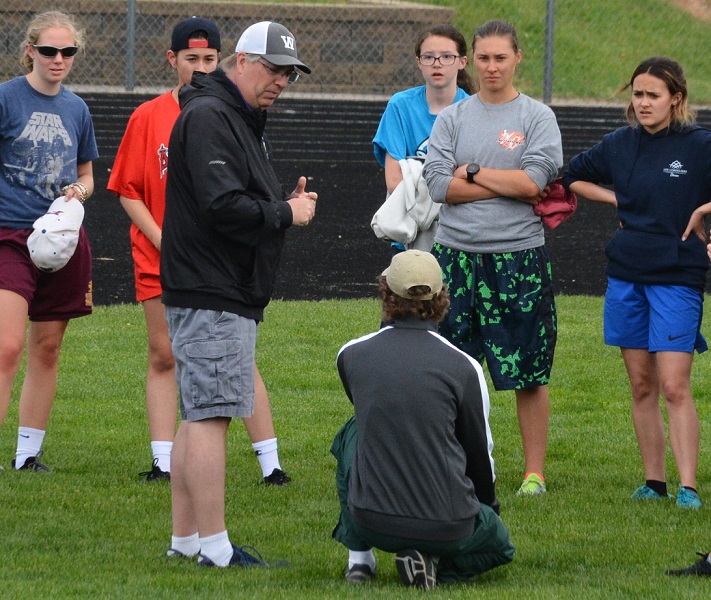 That’s a whale of a list for someone whose “gift for gab” had him headed initially down a path aspiring to be the next Dan Rather. He had earned accolades and opportunities to continue in broadcasting, but found himself instead taking a path back to school to become a teacher, into the classroom and onto the track and sideline, with his communication skills and knowledge no doubt pouring into the multiple books and other pieces he’s written on baseball and local history, the classes he’s taught as a popular social studies and television broadcast teacher at Williamston and the years serving most recently as the public address announcer at many Hornets events.
That’s a whale of a list for someone whose “gift for gab” had him headed initially down a path aspiring to be the next Dan Rather. He had earned accolades and opportunities to continue in broadcasting, but found himself instead taking a path back to school to become a teacher, into the classroom and onto the track and sideline, with his communication skills and knowledge no doubt pouring into the multiple books and other pieces he’s written on baseball and local history, the classes he’s taught as a popular social studies and television broadcast teacher at Williamston and the years serving most recently as the public address announcer at many Hornets events.
“The thing about Mitch is he’s not one dimensional, even in coaching – he can coach many different events. He has many different interests outside of track & field. And when he does something, he does it 100 percent,” Karen Lutzke said. “Even when he started coaching a long, long time ago with me … he just kept learning. He likes working with kids. He enjoys that and watching them get better, whether it’s a guy who’s a 30-foot shot putter or a 45-foot shot putter, or any event. It’s not how far they throw, it’s are they doing the best they can?
“He just likes the kids, and being around them. I think it’s going to be harder than he thinks, retiring – because the kids are what make coaching fun. Being around the kids and watching them have success, and he’s had a lot of success.”
‘Expectation of Excellence’
Williamston has had its fair share of MHSAA Finals individual placers over the years, with the best of those eight top-10 team finishes under Lutzke coming in 2007 when the girls placed fourth in Lower Peninsula Division 3.
The MHSAA Finals team championships are determined by the success of individuals who qualify from Regionals, which could be just a handful. Williamston has shined even brighter, however, at the MITCA Team Finals, where the competition pits full teams against each other and the Hornets’ talent and depth across all events frequently has stood out.
Longtime and similarly-legendary coach Paul Nilsson led both Williamston track & field programs from the 1970s into the 1990s. Lutzke joined him as an assistant for both in 1991 – following Karen after she’d been hired to coach women’s cross country and assist with track & field at Michigan State. In 1993, Lutzke took over the Hornets girls track & field program.
Known now for success in a variety of sports, Williamston during the first decade of the 2000s was most consistently revered for that MHSAA championship-caliber track & field success – and on the girls side, that superiority was rooted in part in the daily grind of January and February workouts often in the school’s hallways or later on an inside track that circles the gym.
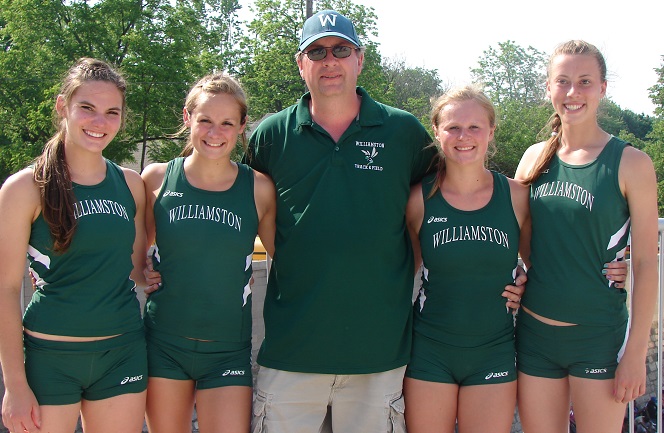 Lutzke’s “Winter Warriors” got a T-shirt if they trained a certain number of days during the offseason. But that was just a small bonus for showing up. The memorable pay offs came three and four months later in league titles, Regional successes, MITCA titles and MHSAA Finals achievements.
Lutzke’s “Winter Warriors” got a T-shirt if they trained a certain number of days during the offseason. But that was just a small bonus for showing up. The memorable pay offs came three and four months later in league titles, Regional successes, MITCA titles and MHSAA Finals achievements.
“I’ve never quite had another experience in my lifetime that demonstrated that as much to me. Now I know moving forward in my life that if I expect to be great at something, or I expect to achieve results, I have to put the work in myself,” said 2019 graduate Jessica Robach, who that spring helped Williamston finish 10th at the MHSAA LPD2 Final running on a championship relay and placing third in long jump and as part of another relay. “It’s really kind of a personal integrity and motivation thing that draws a direct parallel to my career in track and to when I really decided to push myself to be great – you put in the hours of work, and then it finally happens.
“That’s just something Mitch always reiterated to us: That you can have all the natural talent in the world, but a person who works hard is going to get to where they want to be.”
Robach began attending Williamston as a freshman, and didn’t feel entirely comfortable with her new school until track season came – when “everything fell together.”
That “expectation of excellence” wasn’t just about competing athletically, but striving to be a good person. The camaraderie he established, the way he made sure knowledge was passed down from the oldest athletes to the youngest, and again, the emphasis on work ethic overcoming talent, have continued to stick with Robach as she’s gone on to study at Western Michigan.
“Mitch does things the right way. He believes in fair play, hard work, and preparation. He keeps an even keel with athletes – he doesn't get overly hyped when the team is successful or overly critical when the team struggles,” said assistant Ray Herek, who has coached with Lutzke since 2002 and taught with him since 2000. “I have learned a ton from watching him coach. He does an excellent job of knowing how to approach each athlete – he reads people very well. He seems to know what makes each person tick, and finds the right words or coaching tips to help each athlete excel.”
A decade before Robach, Leanne Selinger was learning the same lessons. The team’s leadership award is named after her, and after running on two Finals-placing relays as a senior in 2010 she actually went on to serve as an assistant coach on Lutzke’s staff over the next four seasons while at college.
These days she’s working in supply chain management – a higher-pressure-than-usual field lately because of headline-making materials shortages in a number of industries. But what she learned from Lutzke about being flexible and prepared for the unexpected – in a track meet, maybe a scratch or an injury – while trying to lead people from different subgroups (sprinters, distance runners, jumpers, etc.) toward a common goal are among lessons she continues to keep front of mind.
“Even in my professional career now, I get a lot of feedback that I am not afraid to roll up my sleeves, get dirty,” Selinger said. “And I think that comes from some of my track history with Coach Lutzke and being able to go out, let’s go out and get the job done. If we have to do X-Y-Z, let’s go do it.”
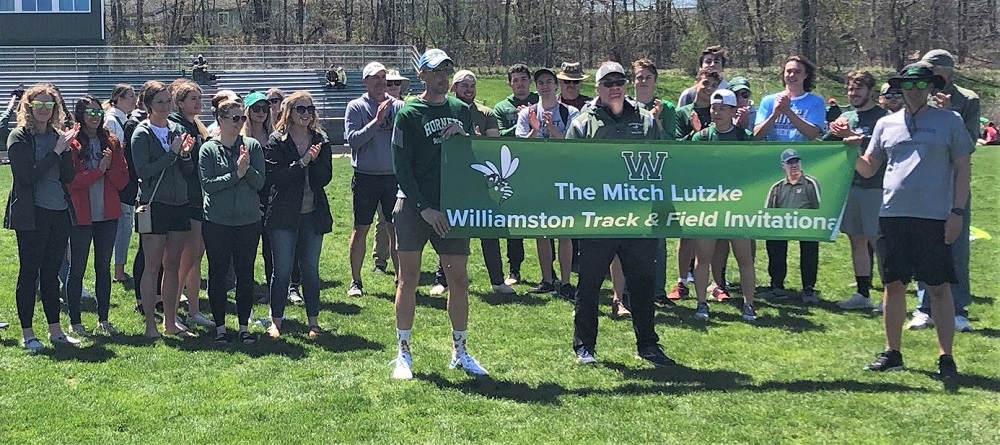
Signing Off
After the couple moved from Illinois, Mitch Lutzke taught in Lansing for five years while coaching at Williamston, then came to Williamston to teach as well. He added coaching in basketball and cross country at the middle school and subvarsity levels, and immersed himself in the family’s new community. Karen Lutzke is now in her second tenure at Olivet College, coaching the women’s and men’s cross country and track & field teams, and the couple has sent three children through Williamston schools with two going on to run at the college level.
Mitch let the decision to retire sink in over this school year – he’s retiring from teaching as well – and eventually he had one more major objective to complete this spring. And he accomplished it.
Williamston track & field wasn’t alone trying to dodge the wrenches thrown its way by COVID-19. But the effects certainly were noticeable.
When the 2020 spring season was suspended (to be ultimately canceled) late that March, Williamston’s teams had practiced four days – with 125 students (nearly 20 percent of the entire student body) signed up and hopes high with lots of talent and experience returning. When spring sports returned a year ago, Williamston was down to 49 athletes in the program – including only 16 girls – with that missing year of older athletes recruiting and mentoring the younger ones striking a massive blow.
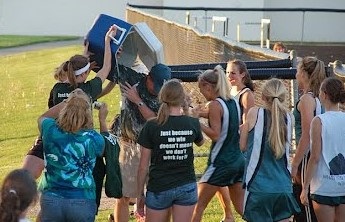 This spring, numbers didn’t return all the way to pre-COVID levels. But 90 athletes came out to put the program on solid footing for this season and whoever comes next.
This spring, numbers didn’t return all the way to pre-COVID levels. But 90 athletes came out to put the program on solid footing for this season and whoever comes next.
“I've been amazed this year how many coaches have approached Mitch with words of appreciation and admiration for the job he has done at Williamston,” Herek said. “Anybody that has coached track and field knows that it is so hard getting kids outside in the spring when it is 40 degrees outside. It is difficult to know how to coach all of the events. It is difficult to know how to reach each athlete – there are so many different types of students that go out for track. But Mitch is as good as it gets.”
He’ll pour his energies into other things. He’s going to do some announcing of Olivet College events. He wants to write more. He’d like to visit baseball spring training for the first time. “Whatever he’s involved, in he’s very passionate about and gets things done,” Karen Lutzke said. “Maybe we’ll have a very clean house (and) the lawn will look wonderful after this.”
Although Williamston’s boys team won’t send anyone to the MHSAA Finals this weekend for the first time in a number of seasons, Mitch Lutzke will bring five athletes to Saturday’s Lower Peninsula Division 2 championship meet at Ada Forest Hills Eastern. They will combine to run two relays, in two more individual races and participate in one field event.
Next year, he’ll cheer from the stands, maybe help move hurdles or clerk a meet if needed. Williamston has renamed its annual meet the Mitch Lutzke Williamston Track & Field Invitational, after all, and the namesake can’t be a no show.
“I say at the end of every year, if you've got more negatives than positives in what you did in track this year, then don't come out (next year). Because we're not changing. This is what we do,” Lutzke said. “I always tell the kids, I want you to support the program of track & field in the community you grow up in or you move to, that you put your kids in track & field because you thought it was a positive experience because of what you went through here in the program, and you just give back.”
 Geoff Kimmerly joined the MHSAA as its Media & Content Coordinator in Sept. 2011 after 12 years as Prep Sports Editor of the Lansing State Journal. He has served as Editor of Second Half since its creation in January 2012, and MHSAA Communications Director since January 2021. Contact him at [email protected] with story ideas for the Barry, Eaton, Ingham, Livingston, Ionia, Clinton, Shiawassee, Gratiot, Isabella, Clare and Montcalm counties.
Geoff Kimmerly joined the MHSAA as its Media & Content Coordinator in Sept. 2011 after 12 years as Prep Sports Editor of the Lansing State Journal. He has served as Editor of Second Half since its creation in January 2012, and MHSAA Communications Director since January 2021. Contact him at [email protected] with story ideas for the Barry, Eaton, Ingham, Livingston, Ionia, Clinton, Shiawassee, Gratiot, Isabella, Clare and Montcalm counties.
PHOTOS (Top) Williamston coach Mitch Lutzke talks things over with his boys team captains last week. (2) Lutzke stands with, from left, Diana Eidt, Cassidy Metzer, Mallory Metzer and Elizabeth Dutcher – who ran on school record-setting 400 and 800 relays in 2011. (3) Lutzke is recognized earlier this spring as Williamston’s annual meet is named after him. (4) Lutzke and assistant Ray Herek (kneeling) confer with their girls team. (5) The 2009 team dumps a cooler over Lutzke’s head to celebrate a Capital Area Activities Conference league meet championship. (Last week’s photos by Geoff Kimmerly; others courtesy of Williamston track & field and athletic department.)

